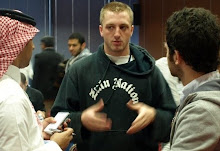
Peace Work has a strong values base and an intense, stimalating theroetical discourse, but at it's heart is the drive to alleviate human suffering and violence that results when effective means of resolving conflicts and transforming the context that produces them are absent.
Myself and an MRDA colleague spent two days in Kukori Payam, Mvolo county this week as part of an interagency team coordinated by the UN Office for Coordination of Humanitarian Affairs (OCHA) working to complete an assessment of internally displaced people whose lives have been disrupted by the ongoing conflict on the border of Mvolo and Yirole West Counties.
This basically consists of interviewing villagers using a cumbersome and time consuming survey form, via a translator (or sometimes two given the variety of local languages. Juba Arabic is a good bridge between them where English is absent) OR, as most of us seemed to do, condensing the survey into 3 or 4 key questions and listening a lot more than one speaks, in order to get a fuller qualitative picture of the situation. This at least reduced both the the tedium and inconvenience both team and the displaced people experienced. Nonetheless it is still a shallow and extractive way of getting information.
Whilst the situation might leave something to be desired the mid-term outcome should be healthier and more secure households. Results will be used to plot the needs in the area for effective distribution of humanitarian aid to those most affected by the violence and displacement. The politics of how, when and why that aid gets deployed probably deserves another post of its own at at later date. I'll focus on what I was involved in as a snapshot of a (relatively) typical NGO activity.
We surveyed households to cross check an existing list taken by local authorities in order to ensure that support provided will be proportionate to the size and needs of the displaced population and also asked questions to gauge Human Security locally including access to clean water and sanitation, food, security from threat of violence and health.
In total our joint team, with representation from various national and international agencies, surveyed over 1000 households, totaling over 6000 people only a fraction of the estimated 20,000+ who are displaced within Western Equatoria as a result of this conflict. Reports from Lakes State indicate that the numbers there could be even higher. To give you an overview of the human impact of conflict, even one as localized and relatively small as this, I’ll share some anecdotal findings.
-Most of the 6000 people are sharing ONE borehole to access water, at least double the average demand. The borehole pump is likely to break soon if the current usage continues, leaving the IDPs without any access to drinkable water.
-The displaced families have no food, their stocks having been destroyed in raiding, and estimates suggest an average of 6-9 months of food has been lost, and more if they are unable to return to their land soon to plant. For communities whose existence depends on subsistence farming this is a major threat to their livelihoods and security.
-At present people are mostly eating cassava leaves and some nuts scavenged from the bush, some only once a day, and are often not eating at all. As they have no income travelling to the nearest safe and active market (itself a 28 KM round trip) to purchase even basic neccesities is not an option for most families. Save the Children made an assessment on the ground and identified numerous cases of malnutrition, at least one very severe, amongst children in Kukori.
-Many families have lost at least one member, either directly to fighting, or in the case of children, in the confusion of fleeing violence, they may have found their way to other IDP camps other side of the border but. The fear of violence at the border was the prime reason for their prescence there. Most of the men from these families were absent, possibly in the bush ready to fight again if neccesary, so the strain on women to act as heads of households is increased.
Reports now indicate that at least some of the promised 'neutral' army forces have been deployed to police the border. Even so the IDPs will also need logistical support (transport, armed and/or unarmed protection etc) and humanitarian aid upon their return to give temporary shelter and help them reconstruct their homes and livleihoods. Cruciually no amount of military prescence will tackle the underlying causes of the conflict that have seen similar situations occur, to various degrees of severity, for the past 5 years or so. In fact an increased militarisation of the situation may in the long run exacerbate cultural division and mistrust.
The cyle of violence on the Mvolo-Yirole border will continue to claim lives and disrupt communities for years to come without meaningful, committed dialogue between leaders and the communities at large. Tommorow in Mvolo is a chiefs meeting to move toward reconciliation; hopefully it will prove more substantive in its outcomes than those of recent years.
